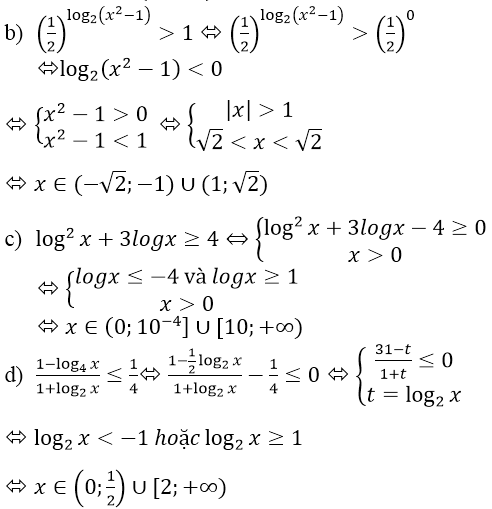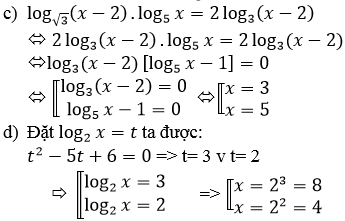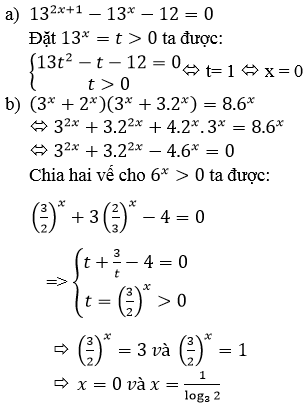Hãy nhập câu hỏi của bạn vào đây, nếu là tài khoản VIP, bạn sẽ được ưu tiên trả lời.

a) Đặt t = 13x > 0 ta được phương trình:
13t2 – t – 12 = 0 ⇔ (t – 1)(13t + 12) = 0
⇔ t = 1 ⇔ 13x = 1 ⇔ x = 0
b)
Chia cả hai vế phương trình cho 9x ta được phương trình tương đương
(1+(23)x)(1+3.(23)x)=8.(23)x(1+(23)x)(1+3.(23)x)=8.(23)x
Đặt t=(23)xt=(23)x (t > 0) , ta được phương trình:
(1 + t)(1 + 3t) = 8t ⇔ 3t2 – 4t + 1 = 0 ⇔ t∈{13,1}t∈{13,1}
Với t=13t=13 ta được nghiệm x=log2313x=log2313
Với t = 1 ta được nghiệm x = 0
c) Điều kiện: x > 2
Vì nên phương trình đã cho tương đương với:
[log3(x−2)=0log5x=1⇔[x=3x=5[log3(x−2)=0log5x=1⇔[x=3x=5
d) Điều kiện: x > 0
log22x – 5log2x + 6 = 0
⇔(log2x – 2)(log2x – 3) = 0
⇔ x ∈ {4, 8}

Đổi về Logarit cơ số 10, ta có :
\(\frac{lgx}{lg\frac{1}{5}}+\frac{lgx}{lg4}\ge1\Leftrightarrow\frac{lg5-lg4}{lg5.lg4}.lgx\ge1\)
Từ đó suy ra
\(x\ge10^{\frac{lg5.lg4}{lg5-lg4}}\)

a) Sử dụng công thức \(\frac{1}{\log_ba}=\log_ab\), hơn nữa \(x=2007!\) nên ta có : \(A=\log_x2+\log_x3+..........\log_x2007\)
\(=\log_x\left(2.3...2007\right)\)
\(=\log_xx=1\)
b) Nhận thấy
\(lg\tan1^o+lg\tan89^o=lg\left(lg\tan1^o.lg\tan89^o\right)=lg1=0\)
Tương tự ta có :
\(lg\tan2^o+lg\tan88^o=0\)
.................
\(lg\tan44^o+lg\tan46^o=0\)
\(lg\tan45^o=lg1=0\)
Do đó :
\(B=\left(lg\tan1^o+lg\tan89^o\right)+\left(lg\tan2^o+lg\tan88^o\right)+......+lg\tan45^0=0\)

1/ ĐKXĐ: \(x>0\)
\(log_{5x}5-log_{5x}x+log_5^2x=1\)
\(\Leftrightarrow\dfrac{1}{log_55x}-\dfrac{1}{log_x5x}+log_5^2x=1\)
\(\Leftrightarrow\dfrac{1}{1+log_5x}-\dfrac{1}{1+log_x5}+log_5^2x-1=0\)
\(\Leftrightarrow\dfrac{1}{1+log_5x}-\dfrac{log_5x}{1+log_5x}+\left(log_5x-1\right)\left(log_5x+1\right)=0\)
\(\Leftrightarrow\dfrac{1-log_5x}{1+log_5x}-\left(1-log_5x\right)\left(1+log_5x\right)=0\)
\(\Leftrightarrow\left(1-log_5x\right)\left(\dfrac{1}{1+log_5x}-\left(1+log_5x\right)\right)=0\)
\(\Leftrightarrow\left[{}\begin{matrix}1-log_5x=0\\\dfrac{1}{1+log_5x}=1+log_5x\end{matrix}\right.\) \(\Leftrightarrow\left[{}\begin{matrix}1-log_5x=0\\1+log_5x=1\\1+log_5x=-1\end{matrix}\right.\) \(\Leftrightarrow\left[{}\begin{matrix}x=5\\x=1\\x=\dfrac{1}{25}\end{matrix}\right.\)
2/ ĐKXĐ: \(x>0\)
\(log_5\left(5^x-1\right).log_{25}\left(5^{x+1}-5\right)=1\)
\(\Leftrightarrow log_5\left(5^x-1\right).log_{5^2}5\left(5^x-1\right)=1\)
\(\Leftrightarrow log_5\left(5^x-1\right)\left(1+log_5\left(5^x-1\right)\right)=2\)
\(\Leftrightarrow log_5^2\left(5^x-1\right)+log_5\left(5^x-1\right)-2=0\)
\(\Leftrightarrow\left[{}\begin{matrix}log_5\left(5^x-1\right)=1\\log_5\left(5^x-1\right)=-2\end{matrix}\right.\) \(\Leftrightarrow\left[{}\begin{matrix}5^x-1=5\\5^x-1=\dfrac{1}{25}\end{matrix}\right.\) \(\Leftrightarrow\left[{}\begin{matrix}5^x=6\\5^x=\dfrac{26}{25}\end{matrix}\right.\)
\(\Leftrightarrow\left[{}\begin{matrix}x=log_56\\x=log_5\dfrac{26}{25}\end{matrix}\right.\)
3/ ĐKXĐ: \(x>0\)
\(2log_3^2x-log_3x.log_3\left(\sqrt{2x+1}-1\right)=0\)
\(\Leftrightarrow log_3x\left(2log_3x-log_3\left(\sqrt{2x+1}-1\right)\right)=0\)
\(\Leftrightarrow\left[{}\begin{matrix}log_3x=0\Rightarrow x=1\\2log_3x-log_3\left(\sqrt{2x+1}-1\right)=0\left(1\right)\end{matrix}\right.\)
Xét (1): \(log_3x^2=log_3\left(\sqrt{2x+1}-1\right)\Leftrightarrow x^2=\sqrt{2x+1}-1\)
\(\Leftrightarrow x^2+1=\sqrt{2x+1}\Leftrightarrow x^4+2x^2+1=2x+1\)
\(\Leftrightarrow x^4+2x^2-2x=0\Leftrightarrow x\left(x^3+2x-2\right)=0\)
\(\Leftrightarrow\left[{}\begin{matrix}x=0\left(l\right)\\x^3+2x-2=0\end{matrix}\right.\) ????
Pt bậc 3 kia có nghiệm rất xấu, chỉ giải được bằng công thức Cardano mà bậc phổ thông không học, nên bạn có chép đề sai không vậy?

a) Tập xác định của hàm số là :
\(D=\left(-\infty;-4\right)\cup\left(4;+\infty\right)\)
b) Tập xác định của hàm số là :
\(D=\left(1;+\infty\right)\)
c) Hàm số xác định khi và chỉ khi \(\begin{cases}x^2-3x+2\ge0\\\sqrt{x^2-3x+2}+4-x\ge1^{ }\end{cases}\) \(\Leftrightarrow\) \(x\le1\) V \(x\ge2\)
Tập xác định là \(D=\left(-\infty;1\right)\cup\left(2;+\infty\right)\)
d) Hàm số xác định khi và chỉ khi
\(\begin{cases}\left|x-3\right|-\left|8-x\right|\ge0\\x-1>0\\\log_{0,5}\left(x-1\right)\le0\\x^2-2x-8>0\end{cases}\) \(\Leftrightarrow\) \(\begin{cases}\left(x-3\right)^2\ge\left(8-x\right)^2\\x>1\\x-1\ge1\\x<-2,x>4\end{cases}\) \(\Leftrightarrow\)\(x\ge\frac{11}{2}\)
Vậy tập xác định là \(D=\left(\frac{11}{2};+\infty\right)\)







d) Điều kiện x>0. Áp dụng công thức đổi cơ số, ta có :
\(\log_2x+\log_3x+\log_4x=\log_{20}x\)
\(\Leftrightarrow\log_2x+\frac{\log_2x}{\log_23}+\frac{\log_2x}{\log_24}=\frac{\log_2x}{\log_220}\)
\(\Leftrightarrow\log_2x\left(1+\frac{1}{\log_23}+\frac{1}{2}+\frac{1}{\log_220}\right)=0\)
\(\Leftrightarrow\log_2x\left(\frac{3}{2}+\log_22-\log_{20}2\right)=0\)
Ta có \(\frac{3}{2}+\log_22-\log_{20}2>\frac{3}{2}+0-1>0\)
Do đó, từ phương trình trên, ta phải có \(\log_2x=0\) hay \(x=2^0=1\)
Vậy nghiệm duy nhất của phương trình là \(x=1\)
c) Điều kiện x>0, đưa về cùng cơ số 5, ta có :
\(\log_5x^3+3\log_{25}x+\log_{\sqrt{25}}\sqrt{x^3}=\frac{11}{2}\)
\(\Leftrightarrow3\log_5x+3\log_{5^2}x+\log_{5^{\frac{3}{2}}}x^{\frac{3}{2}}=\frac{11}{2}\)
\(\Leftrightarrow3\log_5x+3\frac{1}{2}\log_5x+\frac{3}{2}.\frac{2}{3}\log_5x=\frac{11}{2}\)
\(\Leftrightarrow\frac{11}{2}\log_5x=\frac{11}{2}\)
\(\Leftrightarrow\log_5x=1\)
\(\Leftrightarrow x=5^1=5\) thỏa mãn
Vậy phương trình chỉ có 1 nghiệ duy nhất \(x=5\)